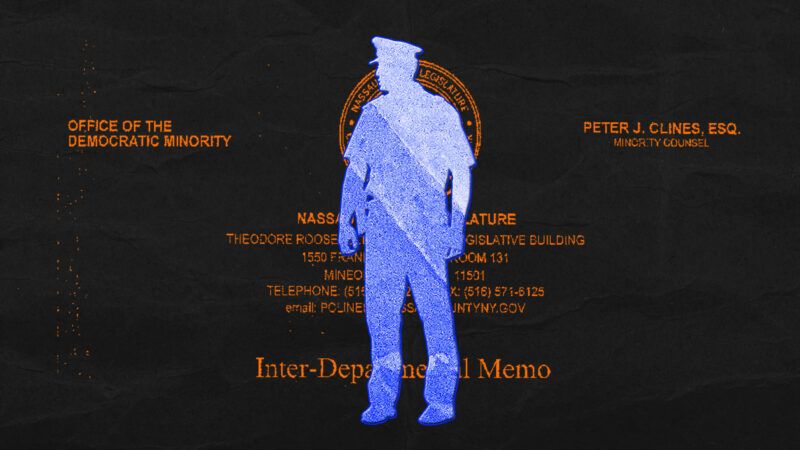Nassau County Passes Bill That Could Make Criticizing a Cop Punishable by $50,000
Yet under qualified immunity, it's incredibly difficult for the public to sue police.

Police officers have difficult jobs, and, in some sense, are charged with protecting the public's right to free speech. It is with that in mind that the local legislature in Nassau County, New York, has passed a bill that could serve to limit the First Amendment rights of those who criticize cops.
"It is the judgment of this Legislature that the recent widespread pattern of physical attacks and intimidation directed at the police has undermined the civil liberties of the community at large," reads proposed local law No. 2021, introduced by Legislator Joshua A. Lafazan, an Independent. "Such violence is therefore a direct assault on the rule of law, every bit as much as suppression of speech by public authorities."
It would appear the irony was lost on the legislators who voted in favor of the bill, which would make police officers a protected class and allow them to sue those who "harass, menace, assault or injure an individual due to such individual's status as a first responder." A police officer who feels aggrieved under the law would be able to commence civil action for compensatory and punitive damages. Anyone found in violation would be subject to an additional $25,000 penalty, which would double if the alleged offender acted out during a riot.
The bill pays a great deal of lip service to violence against police officers, which is something that should indeed be a crime, and, thankfully, already is. That "harassment" of police officers would now merit a $50,000 civil penalty raises a few red flags. For one, the charge is inherently vague. And just how expensive should it be to criticize the government, the entity both charged with protecting free speech and constrained by it?
That cost should be zero, says Ken White, an attorney at the law firm Brown White and Osborn, who tweets under the popular Twitter account "Popehat." "It's basically a threat that, if you protest, not only are things going to happen to you, but now there could be litigation against you," he says. "The record of these types of hate crime provisions shows that they tend to be used abusively by police."
Hate crime laws have indeed engendered a great deal of opposition, primarily from conservatives, who say that such special protections should not be afforded to the litany of minority groups that demand them, including people of color and the LGBT community. And there are many valid reasons to agree with them, as hate crime laws subjectively deem certain biases more egregious than others, effectively undercutting equality under the law.
Yet that hasn't disabused some right-leaning types from supporting the protections for cops. Consider the action taken by the Alabama House of Representatives, which last year passed a bill designating police officers as a protected class under hate crime legislation.
Nassau County is also not the first legislature to float speech-restrictive laws aimed at protecting the government from reproach. As I wrote last week, the Florida House of Representatives is considering a bill that would make it a crime to "indirectly harass" a police officer by getting closer than 30 feet while he or she is on the job. That would effectively make filming a cop illegal, which is without question protected by the First Amendment.
"This is just sheer base-pleasing gesturing by the legislators doing this," says White. "They say it's required because they're being assaulted. Well, let me tell you, I've never seen a situation where actual assaults of cops are not vigorously prosecuted, and if anything, they're prosecuted too easily and questionably. This is really trying to deter speech against cops that might hurt the most delicate person's feelings."
Perhaps most ironic is the bill's passage as the country debates qualified immunity, the legal doctrine that prohibits the public from suing police officers over constitutional rights violations unless the way in which a cop misbehaved has been outlined in a previous court precedent with a sort of painstaking precision. Under qualified immunity, cops have been protected from lawsuits for stealing hundreds of thousands of dollars, damaging an innocent man's home with explosives during a SWAT raid gone wrong, shooting a child, and killing a man who had been asleep in his car. So while the officers who hold a monopoly on state power in Nassau County are entitled to the benefit of the doubt—and then some—it would seem the public is not.


Show Comments (50)